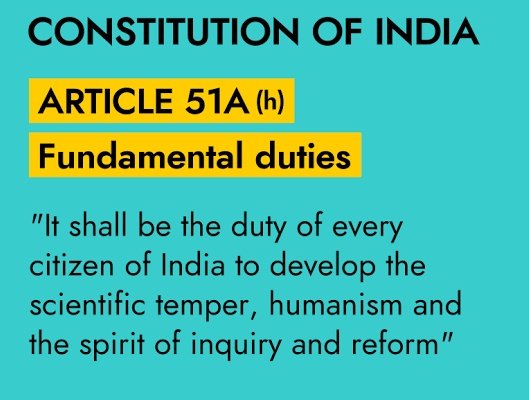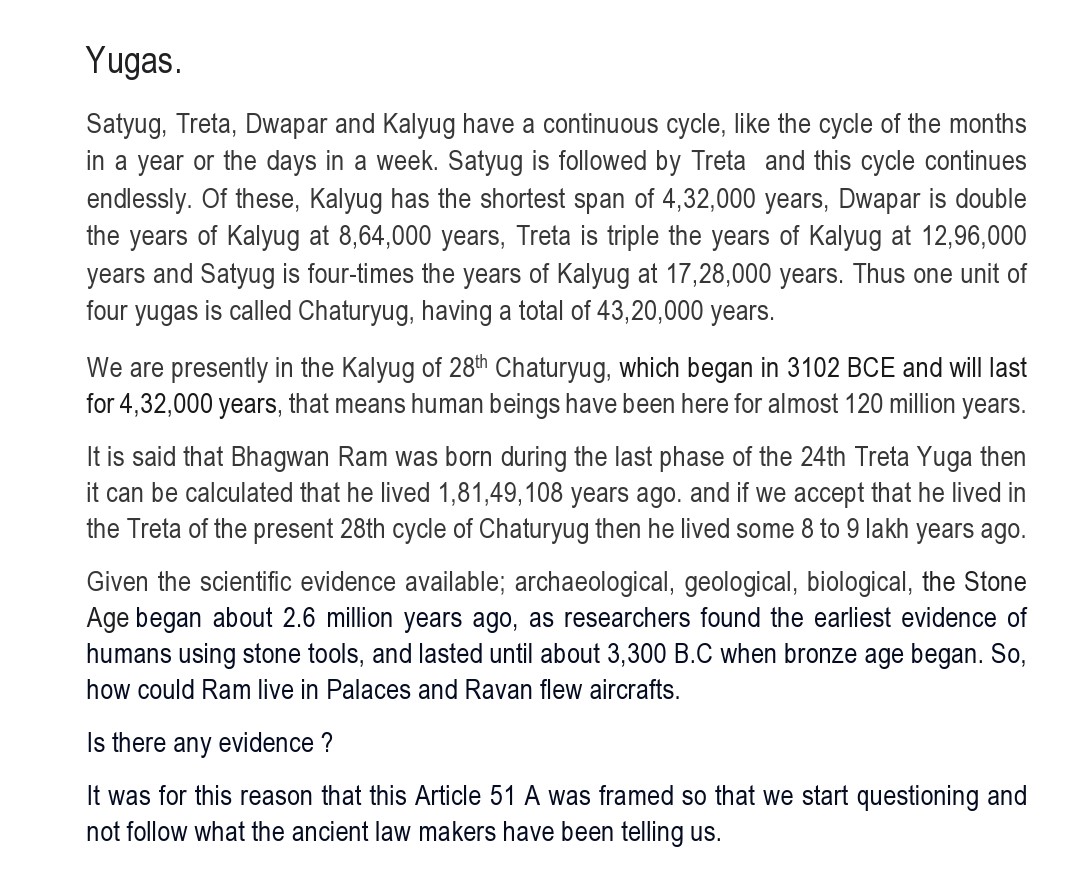
Introduction:
Article 51A (h) of the Indian Constitution plays a unique and crucial role, urging citizens to "develop the scientific temper, humanism, and the spirit of inquiry and reform."
This article was incorporated to encourage questioning and critical thinking, breaking away from historical norms dictated by a select few. The need for such an article arises from a past where societal beliefs were often shaped by a narrow group of individuals, limiting progress and perpetuating unexamined traditions.
Historical Context:
In the 1880s, Mahatma Gandhi faced ostracization from his own community when he chose to pursue studies abroad, reflecting the societal resistance to questioning traditional norms. Laws were framed by those in power, primarily the Brahmin class, who had monopolized education, occupied coveted positions in Kings’ Durbar and influenced the formation of laws. The entire Society was governed by the laws framed by this class and they had a vice like grip on the socio-politico life of the people. This monopoly led to a conformist society, where ancient beliefs were presented as unquestionable truths.
Challenging Ancient Beliefs:
The ancient texts, including the Vedas and Puranas, propagated a few unscientific beliefs such as the cyclical nature of Yugas and cosmogony.
This dogma conflicted with scientific evidence, that lead to the necessity of Article 51A (h) to promote a spirit of inquiry. The discrepancy between religious scriptures and scientific facts, highlights the importance of questioning such narratives.
Even today many of us sing Arti of Laxmiji in which there is a stanza ; " Baanjhan ko putr dev", why should we not do away with it ?
Cosmogony and Manvantara:
The cosmogony described in religious texts often clashes with scientific understanding. The Rig Veda's Purusha Sukta, for instance, outlines a theory of the universe's origin, absolutely conflicting to the scientific evidence. Similarly, the concept of Manvantara, with its cyclical ages lasting billions of years, contradicts established scientific timelines. This stark contrast emphasizes the need for questioning and critical thinking.
For details refer to the pic.



Role of Article 51A (h):
India's leaders, including Jawaharlal Nehru and Dr. B.R. Ambedkar, recognized the importance of instilling a scientific temper in the population. Nehru coined the term "scientific temper," emphasizing the scientific approach as vital for societal progress. He had once said ; “Science is not about just studying Physics and Chemistry, it is about , how one sees things and questions them.”
In The Discovery Of India, Nehruji wrote,
“The scientific approach, the adventurous and yet critical temper of science, the search for truth and new knowledge, the refusal to accept anything without testing and trial, the capacity to change previous conclusions in the face of new evidence, the reliance on observed fact and not on pre-conceived theory, the hard discipline of the mind, all this is necessary, not merely for the application of science but for life itself and the solution of its many problems."
Nehruji and few other leaders of his time like Dr Ambedkar were keenly aware that India’s development and emancipation from the scourge of blind faith, superstition and caste division would require constitutional strength , persistence and scientific temper.
Dr. B.R. Ambedkar emphasized the importance of reason, evidence, and critical inquiry in all aspects of life. He believed that viewing everything with a scientific temperament is essential for the progress of society and advocated for the use of empirical evidences in the understanding social realities.
Article 51A (h) was thus included to empower citizens to question age-old beliefs and embrace a more rational worldview and keep ones faith personal and at home.
Challenges in Contemporary India:
Despite the visionary intent behind Article 51A (h), contemporary India under Mr Modi, faces challenges as certain elements seek to revert to traditional beliefs. The influence of the current government has led to a resurgence of Brahminism, threatening the progress made in fostering a scientific temper. The need for constant vigilance and adherence to the principles of Article 51A (h) is more significant than ever.
Brahminism has got nothing to do with the caste Brahmins as such. It basically implies the emphasis on Rituals, religious customs, traditions, practices.
Conclusion:
Article 51A (h) serves as a beacon for cultivating the scientific temper and fostering an inquisitive mindset. It reminds citizens to question established norms and beliefs, irrespective of religious affiliations. In a rapidly advancing world, the spirit of inquiry is essential for progress, and upholding the principles of Article 51A (h) is crucial for India's continued growth as a modern and enlightened society.
This is applicable to all Religious communities including Muslims and Christians because they also have similar challenges to face.
The outcome of the Path that we are treading today, may be realised in years to come. However, suffice to say today that the Path Pakistan chose in 1947, we are taking it now and we all know where Pakistan has reached in 70 years. In our case the slide down may be faster due to the Social media. If some say that Hindus are not like muslims , then they have to just look within, their behaviour has become like a fundamentalist muslim, implying all Fundamentalists are alike.
